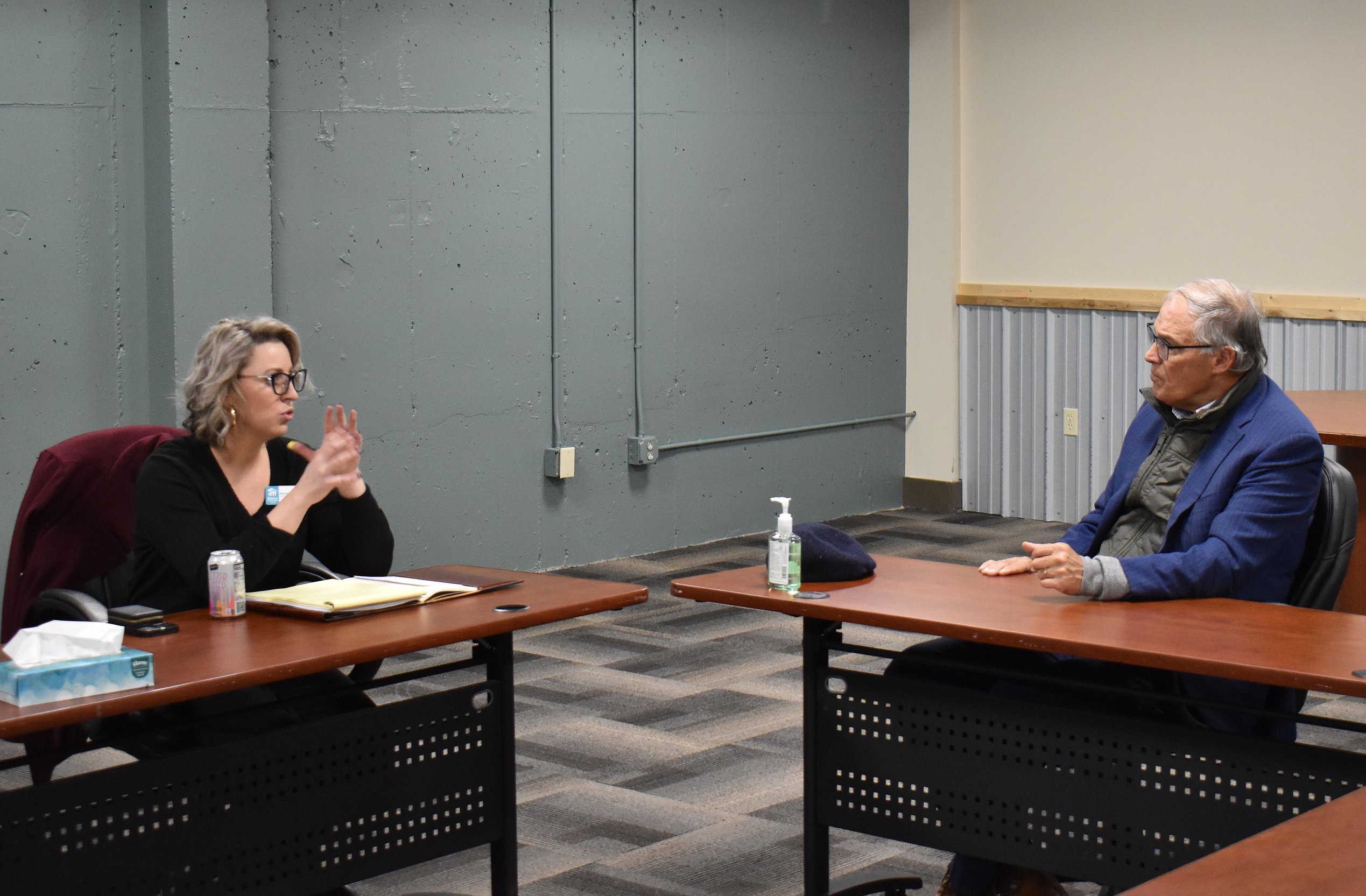Governor seeks input from local Habitat for Humanity chapter
MOSES LAKE — Construction costs and energy efficiency were among the topics of a round table discussion between Washington Gov. Jay Inslee and representatives of Habitat for Humanity in Moses Lake on Wednesday.
“We know we've got a housing shortage,” Inslee said. “And I want to ask your advice on the best way to build housing in the state of Washington. Fundamentally, we have a shortage of dwelling units. Habitat has been such an incredible and efficient help, leveraging volunteer hours; it's so successful the way you do it. But we need we need the public investment with dollars as well.”
Inslee made frequent reference to the Climate Commitment Act, which he signed into law in 2021 and includes provisions to encourage electric vehicle use and lower energy consumption. The law has not been universally popular; a petition was filed last week to create a ballot initiative to repeal the CCA.
Kelly Price, sales manager for Guild Mortgage who works closely with Habitat for Humanity of Greater Moses Lake, said those provisions have raised the cost of building a new home by at least $15,000. The regulations may be a benefit in some parts of the state, she said, but Grant County is not one of them.
“In some counties, I can see the pipe dream ... that these improvements will help save in the long run. For people that are with Habitat for Humanity and people that we're building homes for, they can't afford electric vehicles. We’re very fortunate; Grant County has some of the lowest energy costs in the nation. So the things that are required ... for example, the electric vehicle plug that's now required with the new construction homes. When you do that, the hard part is that upfront investment because the builders are not absorbing that. Habitat for Humanity can't absorb that. That gets passed on to the consumer.”
“That’s why the Climate Commitment Act is so important because it's created a fund to help families like that to afford these types of investments,” Inslee said. “That's why it's been so successful; we've got a billion and a half dollars in this fund that can help people get access to these new energy efficiency improvements.”
Michelle Girardot, CEO of Habitat for Humanity Spokane, said her organization had recently completed two homes built primarily from concrete, which she said improved energy efficiency, made the construction process simpler and increased safety as well.
“I guess the most fun way to describe it is like building with Legos,” Girardot said. “We take these foam forms and we stack all on top of each other. That essentially creates the exterior of the home. And then we pour the concrete into these forms. So instead of many, many weeks or possibly months to complete a home with volunteer labor, it decreases that schedule significantly. The other part of that is fire season. The world is changing, especially for our more rural communities. Many of our community members may be living in prefab units that are going to be much more susceptible to wildfires. These are non-combustible, so not only do they decrease the cost of your energy efficiency aspects, but also your asset will be more effective.”
“Are they cheaper to insure?” Price asked.
“yeah, the house is non-combustible, so you get a significant discount on your homeowner’s (insurance) for that,” replied Robin Moore, president of Habitat for Humanity of Greater Moses Lake and an agent with Basin Pacific Insurance. “The downside is, typically the cost overall is a little more expensive, so your replacement costs might be a little bit higher.”
Alexandra Colin, whose family received Habitat for Humanity’s 13th home in Moses Lake, had nothing but praise for the organization.
“Habitat was a blessing,” Colin said. “It was the perfect timing. It's God's timing. I had gotten laid off, and I didn't know how I was going to pay my mortgage. Right after I got laid off, my mom got diagnosed with (cancer). I was a single mom with three kids. So I didn't know what I was going to do.”
Colin heard about Habitat for Humanity and applied, and was approved a few months later, she said. She and her family moved in eight years ago, she added.
“It's just awesome,” she said. “It's awesome for my kids to actually have their own room, because we lived in a two-bedroom with my mom and my three kids and myself. So this program has been amazing. I thank you.”
“Thanks for sharing your story,” Inslee said. “Good, good news. We want more families to have your success.”
Joel Martin may be reached via email at [email protected].



